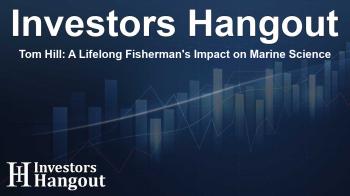Tom Hill: A Lifelong Fisherman's Impact on Marine Science

Working Towards Marine Conservation
Tom Hill's dedication to his work as a fisherman has developed into a robust collaboration with the Gloucester Marine Genomics Institute (GMGI). By sharing his extensive knowledge of the local marine ecosystem, Tom has significantly impacted research and initiatives aimed at preserving marine biodiversity in the area. His firsthand experience as a fisherman equips him with unique insights into the changing dynamics of fish populations and ocean health.
A Unique Partnership with Researchers
The relationship between Tom and GMGI exemplifies the essence of community-focused research. Tom's boat, a familiar sight in Gloucester Harbor, serves as the bridge connecting local fishing practices with scientific inquiry. His stories and experiences provide researchers with invaluable context, enhancing their understanding of ecological changes and fisheries management. This partnership underscores the importance of integrating traditional knowledge with scientific research for effective marine conservation strategies.
Bridging the Gap Between Fishermen and Scientists
The collaboration has fostered an open dialogue between fishermen and marine scientists, making it easier to address ongoing challenges such as overfishing and habitat degradation. Fishermen like Tom are often the first to notice changes in fish behavior, migration patterns, and local ecosystems, providing researchers with real-time data that can inform sustainable practices. This dialogue is crucial for developing strategies that benefit both the fishing community and marine ecosystems.
Importance of Local Fishing Communities
Local fishing communities play a pivotal role in marine research and conservation. The insights gained from seasoned fishermen like Tom are essential in shaping policies and practices that protect the ocean's resources. As custodians of the sea, these fishermen hold a wealth of knowledge that benefits marine scientists and policymakers alike. Their perspectives on fish stocks and marine health continue to inform research aimed at ensuring sustainable fishing practices.
Inspirations for Future Generations
Tom's journey is not just about fishing; it's about inspiring the next generation. His passion for the ocean and commitment to preservation resonate with young learners and aspiring marine scientists. By sharing his story, Tom encourages others to value the ocean and contribute to its stewardship. His example illustrates how one individual can make a significant impact through dedication and a willingness to bridge gaps in understanding.
Educational Outreach and Community Engagement
The Gloucester Marine Genomics Institute actively engages with the community through educational programs and outreach initiatives. These programs aim to raise awareness about marine conservation, the importance of sustainable practices, and the role of fishermen like Tom in environmental stewardship. By fostering a sense of responsibility and involvement, GMGI helps cultivate a future where marine ecosystems are protected and respected.
Final Thoughts on Collaboration
In conclusion, Tom Hill's selfless commitment to marine science highlights the invaluable contributions that local fishermen make to ecological research and conservation efforts. His story serves as a reminder of the profound connection between people and the ocean. As collaborations like the one with GMGI continue to thrive, we can hope for a future where fish populations are healthy, ecosystems are thriving, and the tradition of fishing can be preserved for future generations.
Frequently Asked Questions
Who is Tom Hill?
Tom Hill is a lifelong fisherman with over 40 years of experience fishing out of Gloucester, who collaborates with the Gloucester Marine Genomics Institute.
What is the Gloucester Marine Genomics Institute?
The GMGI is a research institution focused on marine biology, dedicated to understanding and preserving marine ecosystems through collaboration with local communities.
How does Tom contribute to marine science?
Tom shares his knowledge and experiences with researchers, helping them gain insights into local fishing practices and ecological changes.
Why are local fishermen important to marine research?
Local fishermen provide crucial real-time data about fish populations and ecosystem health, which help researchers formulate better conservation strategies.
How can I get involved in marine conservation?
Individuals can participate by engaging in local cleanup initiatives, supporting sustainable seafood practices, or volunteering with marine research organizations.
About The Author
Contact Dominic Sanders privately here. Or send an email with ATTN: Dominic Sanders as the subject to contact@investorshangout.com.
About Investors Hangout
Investors Hangout is a leading online stock forum for financial discussion and learning, offering a wide range of free tools and resources. It draws in traders of all levels, who exchange market knowledge, investigate trading tactics, and keep an eye on industry developments in real time. Featuring financial articles, stock message boards, quotes, charts, company profiles, and live news updates. Through cooperative learning and a wealth of informational resources, it helps users from novices creating their first portfolios to experts honing their techniques. Join Investors Hangout today: https://investorshangout.com/
The content of this article is based on factual, publicly available information and does not represent legal, financial, or investment advice. Investors Hangout does not offer financial advice, and the author is not a licensed financial advisor. Consult a qualified advisor before making any financial or investment decisions based on this article. This article should not be considered advice to purchase, sell, or hold any securities or other investments. If any of the material provided here is inaccurate, please contact us for corrections.

